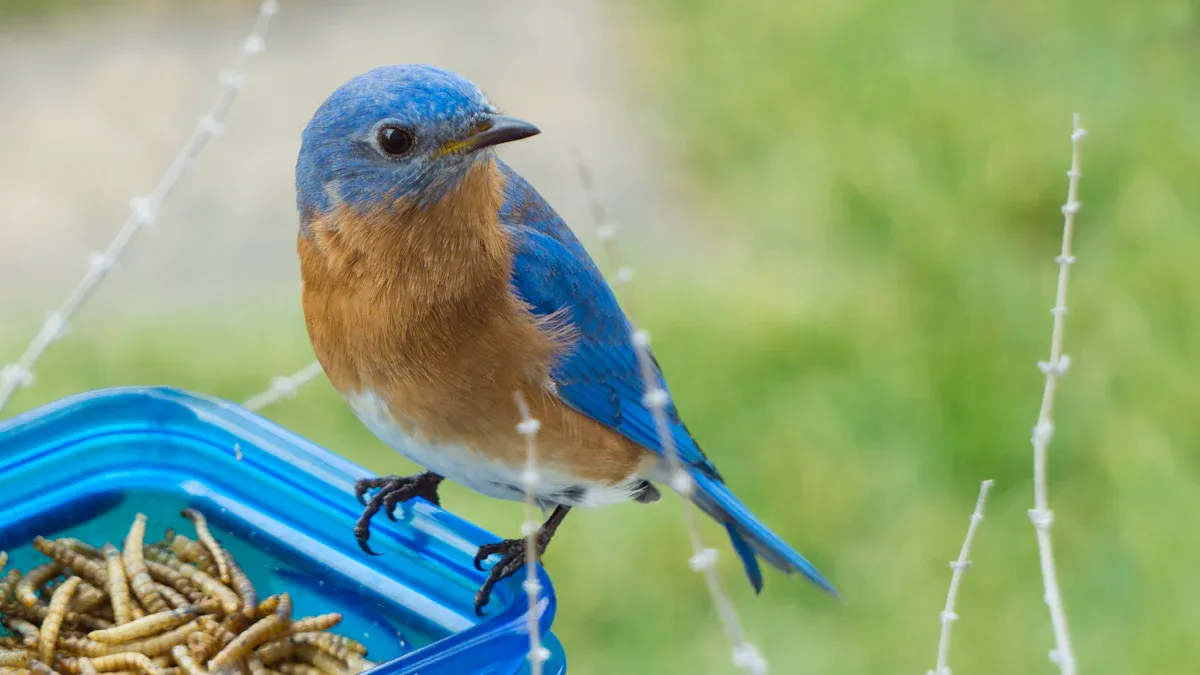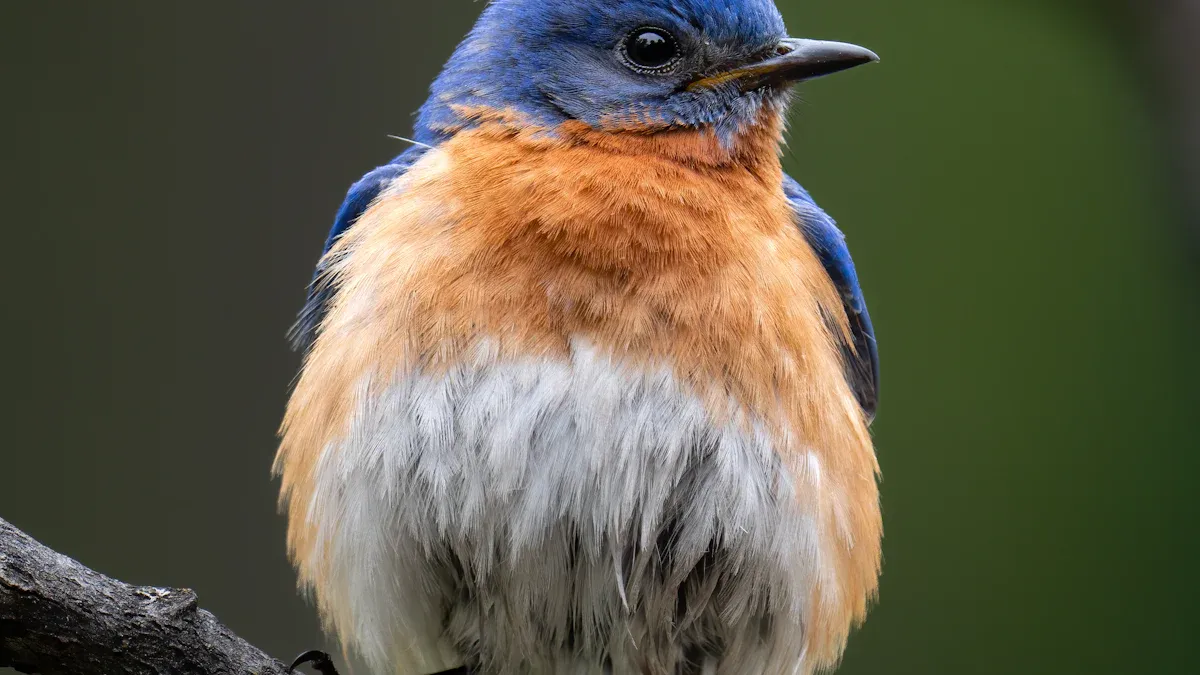
Bluebirds thrive when they have access to the right food. Feeding bluebirds dried mealworms offers a nutritious boost that supports their health and survival. For example, a study in Minnesota showed that bluebirds eating mealworms had better resistance to blow flies. In Central Ohio, suburban bluebirds fed mealworms showed higher survival rates. These small actions make a big difference.
Key Takeaways
- Giving bluebirds dried mealworms helps them stay healthy. It gives them important protein and nutrients, especially when nesting or migrating.
- Dried mealworms bring bluebirds to your yard. This helps them act naturally and survive tough weather.
- These mealworms are simple to keep and use. They are a great option for bird lovers who want to help bluebirds live well.
Nutritional Benefits of Feeding Bluebirds Dried Mealworms
High-protein food for energy, growth, and survival
Bluebirds need protein to thrive, especially during demanding periods like nesting and migration. Dried mealworms are an excellent source of protein, providing the energy they need to stay active and healthy. For young bluebirds, this protein is vital for growth. Studies have shown that feeding bluebirds dried mealworms during the nesting period can improve their survival rates. Nestlings grow faster and stronger when they receive a steady supply of mealworms. In fact, research tracking bluebird nesting success from 2018 to 2021 revealed that food supplementation, including mealworms, positively impacted the number of eggs hatched and fledglings raised. This makes mealworms a powerful addition to their diet.
Essential nutrients that mimic their natural diet
Dried mealworms closely resemble the insects bluebirds eat in the wild. They provide essential nutrients that support the birds’ overall health. These nutrients help maintain strong feathers, sharp eyesight, and robust immune systems. By offering dried mealworms, bird enthusiasts can ensure bluebirds get a diet that mimics their natural food sources. This is especially helpful during times when insects are scarce, such as early spring or late fall. A consistent supply of mealworms can make a big difference in keeping bluebirds healthy year-round.
Supports healthy development of baby bluebirds
Baby bluebirds grow rapidly in their first few weeks of life. They need a nutrient-rich diet to develop properly. Dried mealworms provide the protein necessary for this critical growth phase. Some studies suggest that baby bluebirds fed mealworms may fledge earlier and have higher survival rates. However, moderation is key, as mealworms are low in calcium. Parents often mix mealworms with other food sources to ensure a balanced diet for their chicks. By feeding bluebirds dried mealworms, bird enthusiasts can play a role in supporting the next generation of these beautiful birds.
Encourages Natural Bluebird Behaviors

Attracts bluebirds to nestboxes and feeders
Bluebirds are naturally drawn to areas where food is abundant. Offering dried mealworms can make your yard a favorite spot for these beautiful birds. A trail monitor in Central Ohio observed that bluebirds frequently visited feeding stations in suburban areas during harsh winters. This suggests that providing mealworms helps sustain them when natural food sources are scarce. By placing mealworms near nestboxes or feeders, bird enthusiasts can encourage bluebirds to settle and thrive in their surroundings.
Helps during nesting and breeding seasons
Nesting and breeding seasons are demanding times for bluebirds. Parents need extra energy to care for their young, and nestlings require a protein-rich diet to grow strong. Dried mealworms provide the essential nutrients needed during this critical period. Mealworms also allow parent bluebirds to stay close to the nest, offering protection to their chicks. In cold or wet weather, mealworms can make a significant difference by helping nestlings survive and even fledge earlier. Feeding bluebirds dried mealworms during this time supports both the adults and their growing families.
Promotes feeding habits during migration
Migration is a challenging journey for bluebirds. They need reliable food sources to fuel their long flights. Dried mealworms offer a convenient and nutritious option to help them maintain their energy levels. A study in Minnesota found that bluebirds supplemented with mealworms exhibited stronger immune responses to parasites. This highlights how mealworms can enhance their resilience during stressful periods like migration. By providing mealworms, bird enthusiasts can play a vital role in supporting bluebirds as they travel between their seasonal habitats.
Practical and Convenient for Bird Enthusiasts
Long shelf life and easy storage
Dried mealworms are a practical choice for bird enthusiasts because they last much longer than live mealworms. Their long shelf life means fewer trips to the store and less worry about spoilage. They can be stored in a cool, dry place without requiring special conditions like refrigeration. This makes them an excellent option for those who want to keep a steady supply of food for bluebirds, especially during colder months when natural food sources are scarce.
Simple to use in feeders or mix with other bird food
Feeding bluebirds dried mealworms is incredibly easy. They can be placed directly in feeders or mixed with other bird food to create a balanced diet. Some bird enthusiasts sprinkle them on the ground to mimic the natural foraging experience. This versatility makes dried mealworms a convenient option for attracting bluebirds to your yard. Whether used alone or combined with other foods, they provide a reliable source of nutrition that bluebirds readily accept.
A great alternative to live mealworms
While live mealworms are a traditional choice, dried mealworms offer several advantages. They are easier to handle and store, making them more convenient for bird enthusiasts. A study in Minnesota showed that bluebirds supplemented with mealworms had stronger immune responses to parasites, highlighting the health benefits of mealworm feeding. However, some experts caution that dried mealworms should be offered in moderation, as they lack the moisture content of live ones. Despite this, feeding bluebirds dried mealworms remains an effective way to support their health and well-being.
Feeding bluebirds dried mealworms offers a simple way to support their survival and well-being. Suburban trails with feeding stations reported no dead bluebirds during harsh winters, unlike rural areas. Mealworms provide essential nutrition and encourage natural behaviors. Adding them to your routine can help bluebirds thrive while bringing joy to your backyard.
제품 정보
How often should dried mealworms be offered to bluebirds?
Bluebirds can be fed dried mealworms daily, especially during nesting or migration. Offer small amounts to avoid waste and ensure they complement other natural food sources.
Can dried mealworms attract other bird species?
Yes, other birds like robins and chickadees may also enjoy dried mealworms. Place feeders strategically to encourage bluebirds while minimizing competition from other species.
Are dried mealworms safe for bluebirds year-round?
Absolutely! Dried mealworms are safe year-round. They provide essential nutrients during food shortages in winter and extra energy during nesting and migration seasons.


